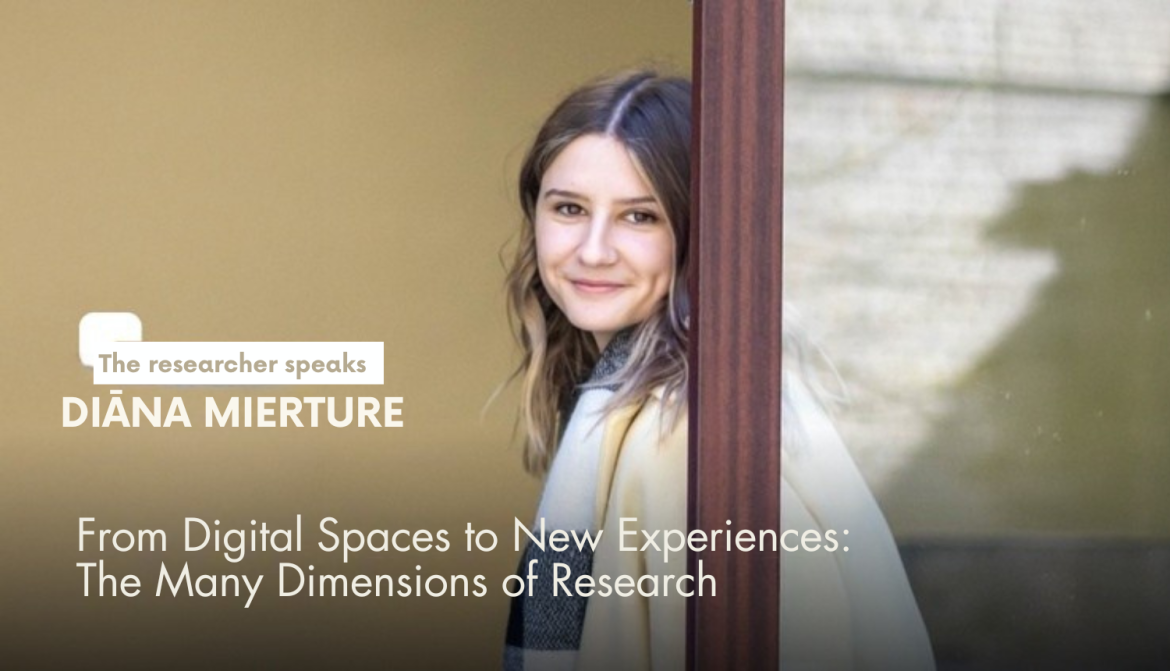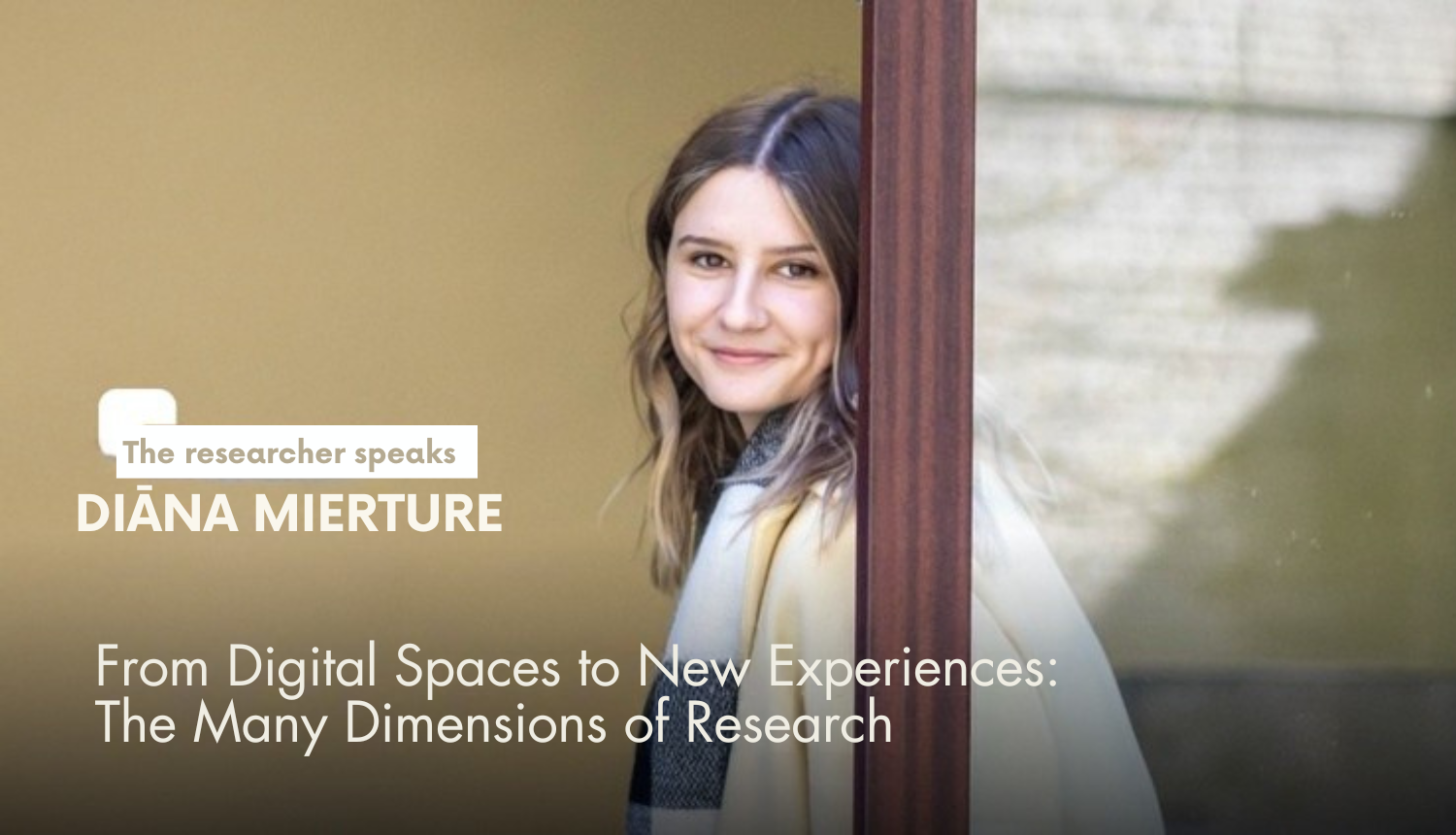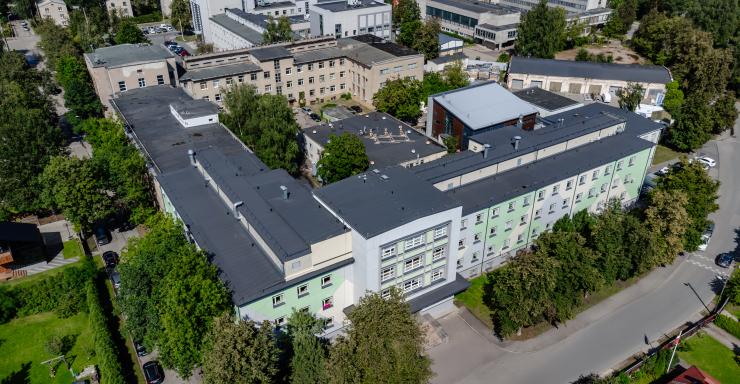Science and research are often associated with the boring image of “sitting at a computer,” endlessly writing, crunching numbers, and making Excel charts. This perception was echoed in a focus group discussion with 12th-grade students conducted as part of the study “Science Consumption and Participation in Latvia.” Of course, the data processing and analysis phase often involves these tasks, but how data can be collected reveals a much broader world - one that encompasses new places, people, experiences, and interests. In reality, research involves far more than just working at a desk.

By the age of 16, I had already decided that I wanted to study cultural research and was convinced that I would pursue this at the Latvian Academy of Culture (LAC). I realised this when I began searching for patterns in the development of culture and the arts through dialogue with literature, people, and other resources. The research process fascinated me so much that I had no doubts about studying at the academy. What mattered most to me was the chance to be among people who would teach me to “see through a researcher’s eyes” - and this has truly become one of the most valuable outcomes of my studies.
Over the course of two years of study, my research interest has introduced me to students from various programs and universities, lecturers, researchers, community members, school pupils, and cultural enthusiasts. This journey has taken me to unfamiliar or lesser-known places in Latvia, including Kazdanga, Pape, Alsunga, Renda, Liepāja, Ventspils, Valmiera, and Ludza, as well as beyond Latvia to Nuremberg, Germany. Throughout the research process, I have been involved in every stage, from developing ideas and securing funding to recruiting respondents and conducting fieldwork, as well as data processing, analysis, writing scientific articles and reports, and presenting results at conferences.
This experience has developed not only academic skills - the ability to write scientific texts, structure ideas, and analyse qualitative and quantitative data - but also other valuable abilities: how to lead group discussions, tailor a message for different social groups, communicate effectively, plan, and work within tight deadlines. I have learned not to be afraid of approaching people, convincing them of an idea’s importance, and preparing both short- and long-term project plans.
One particularly significant experience was surveying cinema audiences in Latvia and conducting a focus group discussion with the youth audience of the Latvian National Symphony Orchestra, alongside my fellow students. I also participated in recruiting respondents for international projects such as “Mapping Cultural Heritage NGOs in Central and Eastern Europe” and “EU Kids Online.” These projects demonstrated that working with people is by no means easier than working with data, and they confirmed the importance of developing the skills mentioned above - skills that are crucial in any research project or field.
Cultural research has helped me discover topics that fascinate me and others that interest me less. Two projects have been particularly influential in this process. The research project “Kazdanga – from Local Stories to Community Identity Networking and Cultural Heritage Digitization,” supported by the LAC research project competition, was the first one in which I participated as a first-year student researcher. My first interview, my first field expedition, and my first encounter with the topic of community identity sparked my interest in community research - an area I continue to explore both individually and in team projects. Additionally, a follow-up project, “Kazdanga Cultural Space Interactive Digital Tool Training,” allowed me to write my first application to the State Cultural Capital Foundation and deepen my knowledge of intangible cultural heritage digitisation and mapping.
I also consider my participation in the baseline research for “Liepāja – European Capital of Culture 2027” important. Together with colleagues, we conducted surveys on public satisfaction with the cultural offerings in the South Kurzeme and Kuldīga regions, as well as in Liepāja. A conversation with a visitor at the “Trubadūrs” singer-songwriter festival in Renda led me to the “Austrasbērni” singer-songwriter community, which I chose as the subject of my first-year research paper - and which I plan to explore further, shedding light on the under-researched phenomenon of Latvian singer-songwriters. Moreover, I felt so connected to the community’s values that I decided to join them myself, developing an interest in singing and playing the guitar. This is how research can reveal not only professionally relevant topics but also personal passions.
At the same time, research has introduced me to entirely different fields. Participation in the Riga Stradiņš University project “J. Prīmanis’ Anthropological Study of the Latvian Population” sparked my interest in anthropology and provided me with the opportunity to try methods uncommon in cultural research - photography, anthropometry, and even 3D scanning. This experience clearly showed that artistic research can intersect with methodologies used in medical research.
Project work has always sparked conversations with other students about their research experiences. Students from different universities have particularly emphasised that LAC students enjoy a unique opportunity to get involved in projects from the very beginning of their studies - to see things from a different perspective, discover new places, collaborate with other students and researchers, receive financial compensation, and most importantly, identify topics and people they want to research early on.
In this regard, a particularly significant experience has been the LAC-supported project “Youth Participation in Contemporary Art Practices: A Case Study of the Project ‘GraffitO!’” In this project, students, together with their peers - researchers and under the guidance of experienced professionals - develop a complete research project from start to finish.
Studying cultural research provides an opportunity to explore so much that it becomes clear what you truly excel at, what captivates you, and what inspires you. The less glamorous side is always present too - Excel spreadsheets, interview transcriptions, deadlines, and sometimes rejected funding applications. Moreover, for a student researcher, completing academic assignments always takes priority. For these reasons, I would not call research boring - writing can certainly be tiring, but it is far from the only thing that defines a researcher’s work.


